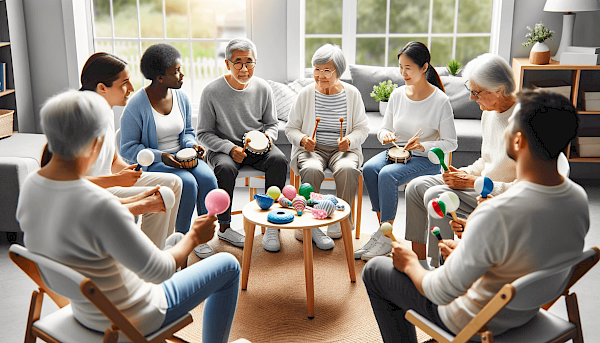The Power of Music: Healing Minds and Hearts in Alzheimer's and Dementia
Understanding the profound impact of music therapy on individuals living with Alzheimer's and dementia is invaluable. For seniors, caregivers, and families, music can bring joy and therapeutic benefits, transforming lives through melodies and rhythms. Let's dive into how this powerful tool can make a difference.
What is Music Therapy?
Music therapy is a clinical and evidence-based practice that uses music to achieve individualized goals within a therapeutic relationship. It involves creating, singing, moving to, and/or listening to music. For Alzheimer's and dementia patients, this form of therapy can significantly enhance their quality of life.
How Music Therapy Helps Alzheimer's and Dementia Patients
-
Boosts Memory Recall: Music has a unique ability to tap into deep memories that are often resistant to the effects of Alzheimer's and dementia. Familiar songs from one's youth can trigger memories and emotions, helping patients recall past experiences and connect with their identities.
-
Improves Mood and Reduces Agitation: Music can be a powerful mood enhancer. It can reduce feelings of depression, anxiety, and agitation common in Alzheimer's and dementia patients. Calming music can soothe, while upbeat tunes can invigorate, leading to improved overall emotional well-being.
-
Enhances Cognitive Function: Engaging with music requires the use of various cognitive functions such as attention, memory, and problem-solving. This engagement can help maintain these functions for longer periods, slowing cognitive decline.
-
Promotes Social Interaction: Group music therapy sessions encourage socialization and communication among patients. Singing together or playing instruments fosters a sense of community and belonging, combating feelings of isolation and loneliness.
-
Encourages Physical Movement: Music often inspires movement, whether it's tapping feet, clapping hands, or dancing. This physical activity is beneficial for maintaining motor skills and overall physical health.

Practical Tips for Implementing Music Therapy at Home
Caregivers can easily incorporate music therapy into their daily routines with their loved ones. Here are some tips to get started:
- Create a Playlist: Compile a list of your loved one's favorite songs, especially those from their younger years. Familiar tunes are more likely to evoke positive responses and memories.
- Sing Together: Singing along to songs can be a joyful and interactive activity. Even if verbal communication is challenging, music often reaches where words cannot.
- Use Instruments: Simple instruments like tambourines or maracas can be used to play along with music. This can be a fun and engaging way to involve the patient in the therapy.
- Movement and Dance: Encourage gentle movement or dance to the rhythm of the music. This not only promotes physical activity but also can lift spirits and energy levels.
- Scheduled Sessions: Integrate regular music therapy sessions into the daily or weekly routine to provide consistency and something to look forward to.
Resources and Organizations
For those interested in learning more about music therapy for Alzheimer's and dementia, here are some valuable resources and organizations:
-
American Music Therapy Association (AMTA): musictherapy.org AMTA provides a wealth of information on music therapy, including resources for caregivers and families.
-
Alzheimer's Association: alz.org The Alzheimer's Association offers information on the benefits of music therapy and how it can be incorporated into care plans.
-
Music & Memory: musicandmemory.org This nonprofit organization brings personalized music into the lives of the elderly or infirm through digital music technology, vastly improving quality of life.
-
Institute for Music and Neurologic Function (IMNF): imnf.org IMNF is dedicated to advancing the therapeutic uses of music and providing access to music therapy for those in need.
Embracing Music Therapy for Alzheimer's and Dementia
Music therapy offers a non-pharmacological approach to improving the lives of those affected by Alzheimer's and dementia. Its ability to evoke memories, enhance mood, and foster connections makes it a powerful tool in caregiving. By incorporating music therapy into daily routines, we can create moments of joy, comfort, and connection for our loved ones.


